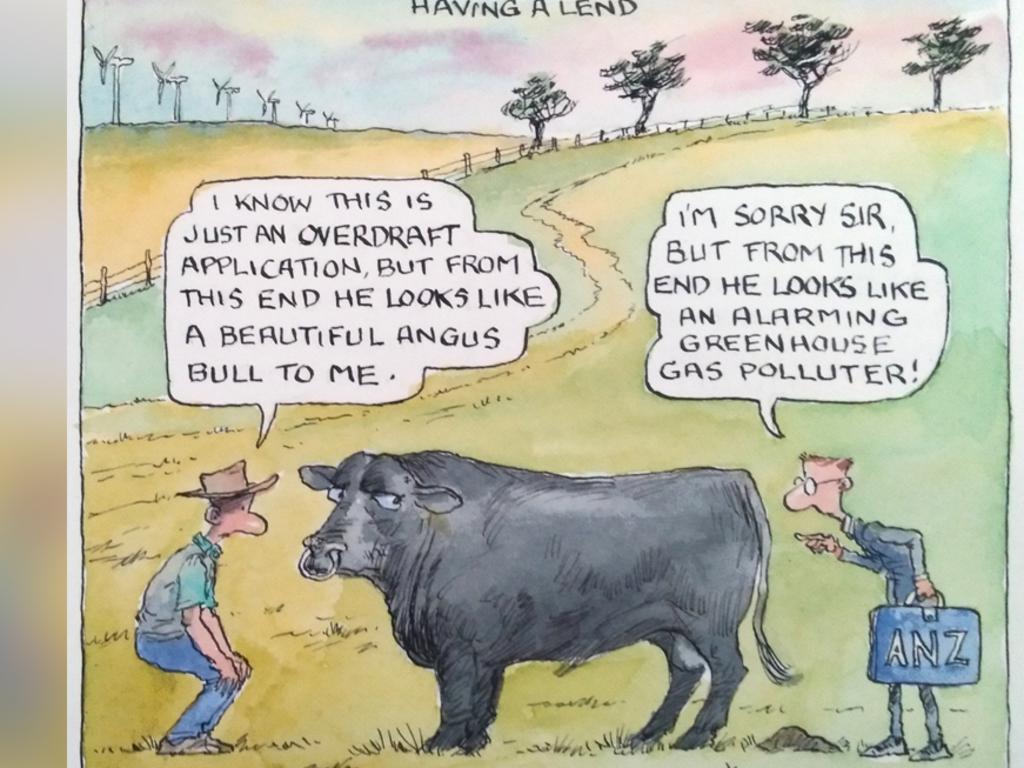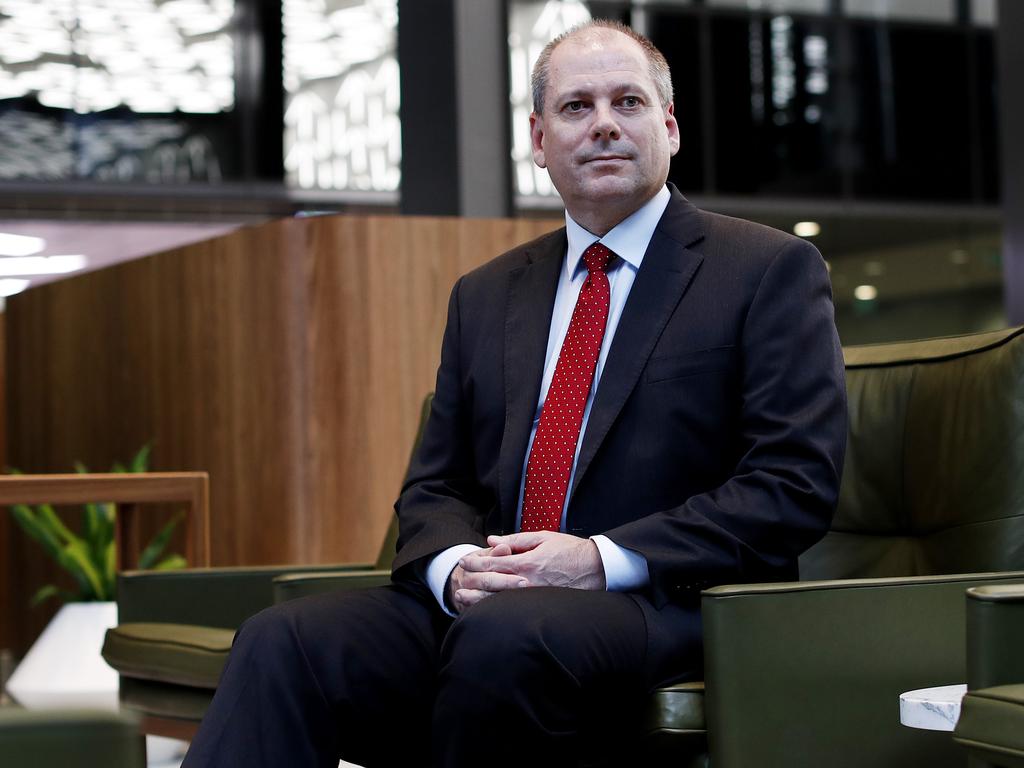Brace for volatility in US after election: Hamish Douglass
Hamish Douglass warns investors to brace for weeks of volatility in global markets in the event of an unclear outcome in the US presidential election next Tuesday.

Hamish Douglass warns investors to brace for weeks of volatility in global markets in the event of an unclear outcome in the US presidential election next Tuesday.
“There’s a distinct possibility we could get an ugly, contested case, where we just do not know the result for days or maybe even weeks,” the Magellan Financial Group co-founder and chairman said.
“I think we just have to expect, if it’s a close election, that we’re going to have a period of uncertainty, and markets don’t like uncertainty.
“We’re not panicking, but people should expect the possibility of volatility next week and for the few weeks after that until we actually get a result, unless there’s a clear victory next Tuesday.”
The warning from one of Australia’s top global fund managers came as US technology giants including Apple, Amazon, Facebook and Twitter dived in after-hours trading on Friday despite reporting stronger-than-expected quarterly earnings. Investors face higher taxes and public spending if Democrats win the US election.
After plunging 3.5 per cent on Wednesday night, the S&P 500 rose 1.2 per cent on Thursday night as the tech giants bounced before their earnings reports, but S&P 500 futures dived 1.9 per cent in after-hours trading.
Nasdaq futures tumbled 2.4 per cent, with Apple down 4.2 per cent, Amazon down 1.8 per cent, Facebook down 2.7 per cent and Twitter down 18 per cent, though Google’s parent company Alphabet jumped 6 per cent.
The VIX index of S&P 500 futures volatility hit a four-month high near 41 per cent this week, forcing some investors to reduce their exposure to assets including Australian equities.
Australia’s S&P/ASX 200 reversed a 0.4 per cent intraday rise to close down 0.6 per cent at a three-week low of 5927.6 on Friday. It lost 3.9 per cent for the week, its worst week in six months.
After rising as much as 7.4 per cent during October amid improving coronavirus trends, a highly supportive federal budget and indications that the Reserve Bank will cut rates and increase its bond buying program at next Tuesday’s meeting, the S&P/ASX 200 finished the month with a 1.9 per cent gain.
Speaking at a Morningstar conference, Douglass noted that amid a record amount of postal votes in US there were already court battles going on between the Republicans and the Democrats challenging how long postal votes could be received after the election.
“Trump is clearly trying to say that anything that is received, even if people voted before the deadline, should not be counted,” Douglass said.
“So if we get into a very close situation in some of these swing states and it’s coming down to a few thousand votes, we could well be caught up in the courts and we could see protests.
“But we will get a result, so if there’s volatility in the markets because we don’t get a result (quickly), I would say just, ‘everyone stay calm, a result will be called’,” Douglass said.
The US election “matters, ultimately, because we will have a different world, depending on the outcome”, but for markets, what matters more is how Democrats go in the Senate.
“Of course if it’s a very clear result, it’s most likely going to be Biden, given that he’s way out in front in the polls, but much closer in five or six key swing states than national polls, and it’s going to be determined in those states.
“But from a longer-term perspective, after the initial volatility if we get that contested election, you really have to … come down to what happens in the Senate.”
If Joe Biden wins the White House and the Democrats also get the House of Representatives but not the Senate — where the race is closer — Douglass said “not much will happen from an investment perspective because there will be a very strong check and balance on the Democrats”.
“So in most cases, I would say, well, we will get probably calmer international relations but no sort of radical legislation that would go through and spook investors,” he said.
If the Democrats also take the Senate, the “market’s going to start to really start to focus” but because of the filibuster they would need 60 seats rather than a 51 seat majority to control most legislation, and while there’s a push to remove the filibuster, not all Democrats want to.
“If that really got momentum, and they win all three — the trifecta — and they effectively decide to remove this rule called the filibuster, then I think it may start to matter because that would give the Democrats unfettered control to pass any legislation they wanted,” Douglass said.
“And there is some legislation, particularly on the very extreme left side of the Democratic side, which could really spook markets.
“But the Democrats aren’t just one single voice, they’ve got factions, and the major faction is a big faction — Biden comes from the moderates.
“Therefore we’re not that concerned that we’re suddenly going to get radical legislation going through so, other than some initial volatility, we’re not overly concerned from a markets point of view of a Biden victory, even if they take this trifecta and even if we start to get this debate about the Senate rule being changed.
“But of course there’s areas which you should focus on as an investor.”
One area of change under the Democrats would be environmental policy based around cutting tax breaks for oil and gas producers and replacing coal-fired generation with renewables.
“From (Magellan’s) point of view, we’re very positively skewed,” Douglass says.
“We actually own a lot of utilities in our portfolio in the US and those utilities would have an acceleration in investment in replacing the generation with more renewable energy.
“They’re already on that pathway — an acceleration would increase their earnings over time — and actually utilities have been going up as it looks more certain of a Biden victory.
“I shouldn’t use that word, ‘certain’ — everyone thought Clinton was going to win in 2016, and at this stage, some of those crucial states appear to be tightening so nothing is certain.”
Healthcare regulation is another area where the Democrats want to go further towards a public option and regulating drug prices, and Douglass recommended caution in that sector.
“We’ve got very minor exposure now in US healthcare — we sold down some of our healthcare exposure in the US a while ago because of the likelihood of a Biden win,” he said.
Taxation is another concern as the Democrats want to lift the corporate tax rate to 28 per cent, from 21 per cent — shaving about 8 per cent off US corporate earnings — while also boosting tax rates for capital gains and high-income earners.
“We’ve reduced our exposure: we still have large exposure to US corporations but less than we had, but we’ve factored that into our models — a 28 per cent tax rate as our base case,” Douglass said.
A “pathway” toward greater regulation of technology giants was also something to consider.
“If anything, the market is optimistic they’re going to get a much larger stimulus passed if the Democrats win
“If they get the Senate, it’s very likely there’s going to be a large stimulus bill passed so if they get the trifecta you may well see the markets go up.”








To join the conversation, please log in. Don't have an account? Register
Join the conversation, you are commenting as Logout